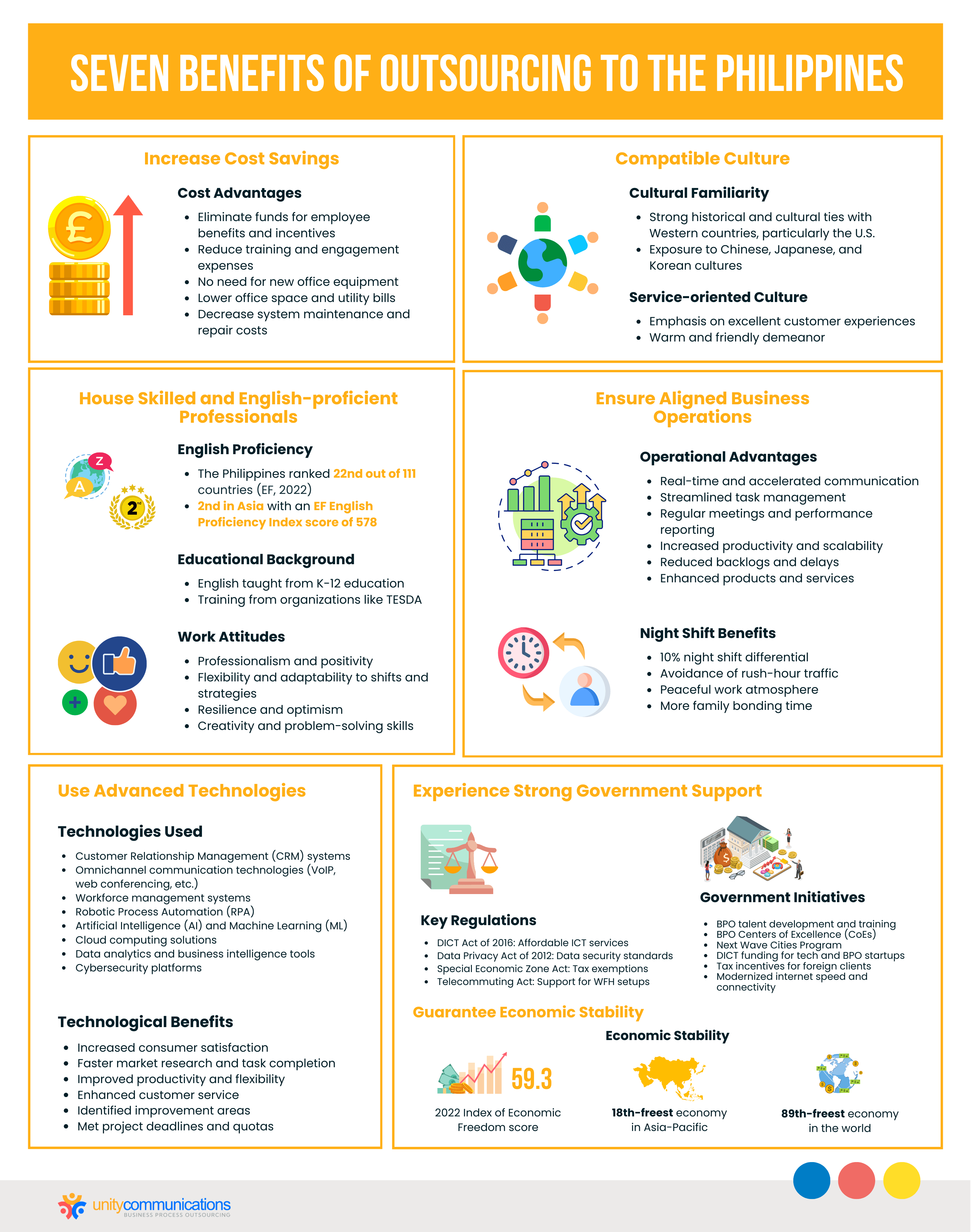IN THIS ARTICLE
Table of Contents
To cope with an ever-evolving business environment, companies constantly seek innovative approaches to boost efficiency while reducing costs. Outsourcing has become the key to achieving that goal and gaining a competitive advantage.
While numerous outsourcing destinations exist, one country has captured the attention of organizations worldwide: the Philippines. Renowned for its English-proficient workforce, cultural compatibility, and cost-effective services, the archipelago has become a popular hub for finding Philippine offshoring providers.
Let us discover why by exploring the benefits of outsourcing to the Philippines.
A Brief Overview of Offshoring

Small, medium-sized, and large enterprises seeking enhanced operations and cost savings adopt offshoring. Also called offshore outsourcing, this practice involves hiring overseas providers to handle non-core functions, allowing clients to focus on revenue-generating initiatives.
Globalization and the talent shortage play crucial roles in the increasing demand for offshoring. As businesses expand their operations globally, they look for creative ways to access new markets without overspending. However, the shortfall of skilled professionals due to rapid tech advances and changing needs hinders companies from scaling quickly and effectively.
Many organizations thus offshore to Asian countries such as the Philippines to take advantage of a large and affordable talent pool. As a result, the Asia-Pacific outsourcing market reached $68.8 billion in 2022. Visiongain expects the industry to expand at a compound annual growth rate (CAGR) of more than 8% by 2033.
The Philippines as a Popular Offshoring Destination
The Philippines became a popular offshoring destination because it has skilled and English-fluent professionals. This workforce can quickly adjust to changing business requirements while maintaining exemplary work performance.
Because the country has a lower cost of living, organizations receive high-quality support services without spending significant funds on wages and training expenses. Cultural and linguistic affinities also urge businesses to hire third-party Filipino workers.
Due to the nation’s ability to meet the international need for third-party support, many companies partner with Filipino providers. The Philippine outsourcing sector thus expanded by more than 10% to $32.5 billion in 2022, based on data from the IT and Business Process Association of the Philippines (IBPAP).
Types of Philippine Offshoring Services
Before tackling the benefits of outsourcing to the Philippines, note that Filipino vendors provide different types of front- and back-office support. Clients can acquire the following services wholly or partially, depending on their budgets and necessities:
- Customer service covers pre- and after-sales consumer support via calls, live chat, email, and social media. Service providers optimize an omnichannel system to personalize and ensure seamless customer interactions.
- Information technology (IT) support involves technical assistance for hardware and software platforms. Its functions include desktop support, system maintenance, and repairs.
- Finance and accounting services include accounts payable and receivable management, bookkeeping, tax preparation, and financial reporting.
- E-commerce support means assisting online shops. It covers services such as order processing, inventory management, and shipment tracking.
- Data entry services encompass the encoding, sorting, and monitoring of information within computer applications, databases, and spreadsheets.
- Healthcare assistance includes non-clinical support services such as medical billing, coding, and transcription. Delegating these tedious tasks allows medical organizations to focus on patient care.
- Human resource (HR) support entrusts all aspects of employee management to a service provider. These processes include recruitment, onboarding, payroll processing, and training.
- Sales and marketing comprise support services such as market research, lead generation, content development, advertising, and social media management. Employing a third-party team helps businesses expand their enterprises at lower costs.
- Product manufacturing means contracting Filipino providers to conduct production-related activities, from design to supply chain management.
- Knowledge process outsourcing (KPO) taps into service vendors’ capabilities to accurately and quickly perform data-driven tasks. KPO vendors optimize data analytics tools to study market trends and support strategic decision-making.
- Legal process outsourcing (LPO) involves letting Philippine providers handle legal tasks such as compliance review, contract drafting, and litigation support.
Seven Benefits of Outsourcing to the Philippines

Like other investments, companies will only adopt Philippine offshoring if they can gain something from it. Likewise, the world will only recognize the country as a go-to hub for outsourcing if it can support business growth.
As you plan to expand your enterprise, you are probably wondering: Why offshore to the Philippines?
The answer to that question is detailed below:
1. Increase Cost Savings
Working with a service provider fills in-house gaps, improves daily operations, and increases cost savings. As mentioned, the Southeast Asian archipelago has lower living and labor costs than the United States.
For instance, hiring an in-house chat support representative for your e-commerce business in Phoenix, Arizona, will, on average, cost you $19 per hour. But when you fill the role with the help of a Philippine service provider such as Unity Communications, you only pay $9.50 an hour.
In addition to affordable labor fees, expect the following cost advantages when offshoring to the Philippines:
- Eliminate the need to allocate funds for employee benefits and incentives.
- Reduce dedicated training and workforce engagement expenses.
- Remove the need to buy new office equipment such as laptops and mobile devices.
- Worry less about increased office space and utility bills.
- Cut costs on system maintenance and repairs.
Filipino providers also simplify how you opt in or out of their services. You can sign a service-level agreement (SLA) for long-term support and pay the agreed-upon monthly fees. You can also pay hourly or for every after-service completion for short-term commitments.
2. House Skilled and English-proficient Professionals
Skilled and English-proficient professionals are among the most important benefits of outsourcing to the Philippines. Your English-native customers prefer speaking with experts who can interact with them naturally. So hiring Filipino workers is your best option.
The country uses English as an official language and includes it as a core component of the educational system. Filipino students learn English, from basic grammar rules to more complex elements, throughout their K-12 education. Some have spoken the language fluently since childhood, while others train to neutralize their accents.
Education First (EF) ranked the Philippines 22nd out of 111 countries with high English proficiency in 2022. The nation also secured the second spot out of 24 Asian countries in terms of English fluency. Its EF English Proficiency Index score of 578 proves the country’s competency in the language.
Besides being formally educated, many Filipino workers participate in career development programs to enhance their knowledge and skills. They attend seminars, workshops, and training sessions from certified organizations such as the Technical Education and Skills Development Authority (TESDA).
Also, these professionals possess the work attitudes listed below that attract businesses to outsource to the Philippines:
- Filipinos take their professionalism seriously. Despite heavy workloads, they maintain a positive attitude at work. They value teamwork and always make sure to finish the tasks at hand. Most importantly, they are patient, even when dealing with rude customers.
- Flexibility and scalability are Filipinos’ secret weapons for exemplary performance. They can quickly adapt to changing business strategies and policies. They can work well in rotating shifts despite differing time zones, especially during hectic periods.
- Filipino workers are born resilient and optimistic. When hiring customer service outsourcing in the Philippines, expect to work with professionals who stay positive amid crises. They keep calm no matter what happens.
- Philippine service vendors employ creative and competent Filipino talent. These workers always find innovative ways to resolve problems and alternatives to fill resource insufficiencies. They execute such actions to help meet their personal and team objectives.
3. Compatible Culture
Cultural compatibility is a sought-after benefit of outsourcing to the Philippines. The nation has a strong historical and cultural connection with Western countries, particularly the U.S.
The American culture’s influence is evident in various aspects, including education, media consumption, and business practices. This cultural familiarity facilitates better understanding and alignment with Western clients’ norms, values, and business etiquette, resulting in smoother collaboration.
Filipinos are also familiar with other cultures, such as Chinese, Japanese, and Korean. This exposure and the resulting cultural sensitivity allow them to understand nuances, appreciate differences, and work respectfully with clients from diverse backgrounds. Such capabilities support businesses operating in multicultural markets.
Furthermore, the Philippines has a service-oriented culture emphasizing excellent customer experiences. Filipinos are known for their warm and friendly demeanor. Companies especially value these qualities in customer service roles. Hence, Philippine offshoring helps them boost consumer satisfaction and retention.
4. Ensure Aligned Business Operations
A Filipino provider’s ability to match your business operations is one of the critical benefits of outsourcing to the Philippines. Providers organize and train skilled staff to align with your business requirements and work during operating hours.
So if you operate in the U.S. and hire a Filipino service vendor, anticipate the following advantages despite different time zones:
- Real-time and accelerated communication
- Streamlined task management and designation
- Regular meetings and performance reporting
- Improved productivity and scalability
- Reduced backlogs and project delays
- Enhanced products and services
You do not need to worry about Filipino professionals’ ability to produce high-quality outcomes during graveyard shifts. Many workers take this chance to maximize the following benefits:
- Ten percent night shift differential for late-night work between 10:00 p.m. and 6:00 a.m.
- Opportunity to avoid rush-hour traffic
- Chance to work in a more peaceful and calm atmosphere
- Time to bond more with families and friends
5. Use Advanced Technologies
Advanced technologies support the various benefits of hiring business process outsourcing (BPO) from the Philippines. Filipino providers use these up-to-date solutions to enhance the customer journey, empower staff, and drive continued growth. They optimize the systems below to speed up daily operations:
- Customer relationship management (CRM) systems facilitate interactions for improved consumer support. These platforms serve as a client data repository, giving BPO professionals easy access when providing personalized customer service.
- Omnichannel technologies host seamless, real-time communication between clients, BPO teams, and end customers. These solutions include voice-over-internet protocol (VoIP) systems, telephones, web conferencing tools, email services, instant messaging platforms, and social media.
- Workforce management systems help organize employee schedules, monitor attendance, and track productivity. They also ensure efficient resource distribution, SLA compliance, and accurate performance reporting.
- Robotic process automation (RPA) automates repetitive, basic, and rule-based tasks. Philippine BPO companies use software bots to boost efficiency, minimize errors, and give human agents more time to focus on valuable activities. This technology accelerates data entry, inquiry responses, and form filling.
- Artificial intelligence (AI) and machine learning (ML) technologies improve data analysis and decision-making. If combined with RPA solutions, AI and ML can automate document processing tasks, conduct sentiment analyses, and implement intelligent chatbots for fast, 24/7 customer support.
- Cloud computing solutions let BPO companies in the Philippines store and access data securely over the Internet. This technology enables remote collaboration in real time without requiring extensive hardware investments.
- Data analytics and business intelligence tools assist workers in extracting actionable insights from vast amounts of market data. These technologies help analyze key performance metrics, industry trends, and buying patterns. The resulting insights inform strategic decisions to further improve products and services.
- Cybersecurity platforms protect sensitive customer and business data by quickly detecting and mitigating cyber threats. These solutions include firewalls, data encryption technologies, remote access controls, intrusion detection systems, and data loss prevention tools.
You can anticipate the following benefits of outsourcing to the Philippines when leveraging modern and robust technologies:
- Increase consumer satisfaction and retention rates.
- Accelerate market research and analysis.
- Expedite the completion of repetitive tasks and processes.
- Improve productivity, flexibility, and scalability.
- Personalize and enhance customer service.
- Identify complex issues and areas for improvement.
- Meet project due dates, daily quotas, and changing requirements.
- Prioritize business development projects and core competencies.
- Boost the bottom line.
6. Experience Strong Government Support
The government strongly supports the industry’s growth because of the vast benefits of outsourcing in the Philippines. The Philippine administration implements these rules and regulations to support local BPO providers and foreign clients:
- The Department of Information and Communications Technology (DICT) Act of 2016 founded the DICT to provide access to affordable and robust ICT services. The department set standardized policies to bolster the country’s ICT industry.
- The Data Privacy Act of 2012 tracks public and private sectors’ data collection, use, and disclosure. The law ensures all enterprises, including BPO companies, comply with international data security standards. It requires companies to seek individual consent before gathering sensitive data and imposes fines for violations.
- The Special Economic Zone Act establishes and oversees special economic zones across the region to encourage foreign investments and drive national economic development. It gives tax exemptions that indirectly benefit foreign companies outsourcing to the Philippines.
- The Telecommuting Act encourages private-sector employers to allow work-from-home (WFH) or hybrid work setups. The law aims to enhance efficiency, minimize traffic congestion, and promote work-life balance among employees.
Besides these laws, the Philippine government has developed programs to expand the BPO industry’s economic contribution. These efforts help the administration ensure the offshoring industry becomes one of the fastest-growing sectors in the country. Here are a few of the government initiatives made to support the BPO sector:
- The national government works with organizations to host and improve BPO talent development and training programs. For instance, TESDA partners with BPO associations to provide workshops and hold training sessions.
- Setting up BPO centers of excellence (CoEs) nationwide helps ensure the industry’s long-term growth. These COEs offer various incentives to service providers and clients. The CoE hubs include Metro Manila, Metro Cebu, and Davao City.
- The Next Wave Cities Program establishes BPO hotspots beyond Metro Manila. The project opens digital job opportunities for applicants in the provinces. It also helps BPO companies lower their operating expenses.
- The DICT provides significant funding to assist tech and BPO startups in developing their products and services. The department also gives them access to resources, mentorship programs, and networking opportunities.
- Tax incentives attract foreign clients to acquire BPO services from Filipino service vendors. The benefits received by outsourcing companies in the Philippines include tax holidays and lower corporate income tax rates.
The government also modernized the country’s internet speed and connectivity. This investment helps Philippine BPO providers deliver services quickly and effectively. The administration’s broadband-focused efforts include the following:
- Fast-tracking the licensing process for internet service upgrades
- Collaborating with private companies for fiber-optic connectivity programs
- Establishing a national broadband network
- Developing undersea internet cell sites and cables
- Installing free public Wi-Fi nationwide
7. Guarantee Economic Stability
The Philippine government’s support of the BPO industry ensures economic stability. The Philippines scored 59.3 on the Heritage Foundation’s 2022 Index of Economic Freedom. The country has the 18th-freest economy in Asia and the Pacific and the 89th-freest economy in the world.
This economic stability guarantees you the expected benefits of outsourcing to the Philippines. The financial freedom index helps you decide whether working with a Filipino provider is a safe and worthwhile investment.
For example, a BPO provider based in a country with an unstable economy might give you adverse outcomes without giving you returns. But if you outsource to the Philippines, anticipate achieving the same advantages discussed in the previous sections.
Potential Challenges of Hiring Philippine Providers
While the Philippine BPO market presents numerous advantages, the challenges of employing a Filipino service vendor remain. Acknowledging the pros and cons of outsourcing to the Philippines guides you in creating a comprehensive BPO plan. See below for the possible downsides that require attention when outsourcing to the country:
Reduce Quality Control
Partnering with providers in a different country entails letting go of a certain level of control over your products and services. It becomes challenging to closely monitor your BPO partner’s every action while concentrating on your core operations onshore.
The Philippine BPO industry has established a good reputation, with providers receiving certifications and positive client feedback for their expertise and excellence. Nevertheless, having effective and open lines of communication with your BPO partner ensures a smooth workflow and high-quality output.
Encounter Cybersecurity Risks
Hiring online Philippine BPO services exposes your business to cybersecurity risks. IBM’s latest data indicates that cybercriminals have recently exploited over 78,000 known vulnerabilities. These malicious actors often target older and unpatched systems.
Failure to develop a comprehensive vulnerability management strategy with your BPO partner leaves your systems vulnerable to hackers. These attackers can manipulate your system’s weaknesses and compromise your confidential data. Increased spending is necessary to resolve the breaches and recover from the aftermath.
Deal with Transparency Issues
Although you receive benefits when outsourcing to the Philippines, transparency issues might still arise. Offshoring entails sharing valuable business assets and sensitive files. While infrequent, some BPO companies hesitate or refuse to provide vital information.
Such transparency gaps undermine the trust between you and your BPO partner, possibly harming your working relationship. Consequently, these challenges result in increased mitigation expenses, substantial project delays, and potential revenue losses.
Face Technical Problems
Modern technologies play a vital role in pursuing operational efficiency; however, they also introduce complex challenges that significantly impact daily productivity.
Not prioritizing system monitoring and maintenance with your Philippine BPO partner leads to technical issues such as downtime and lags. Prolonged issues cause output delays, sluggish responses, and increased costs.
Experience Cultural and Time Zone Variations
While Filipino providers adapt to your business operations, the challenges of time zones and cultural differences persist. Insufficient communication and collaboration strategies have a detrimental effect on project timelines.
Despite the Philippines’ strong affinity for Western culture, such differences also influence decision-making processes and work styles. Thus, differing task interpretations and implementation approaches might result in misunderstandings and goal misalignments.
The Bottom Line

Outsourcing to the Philippines offers numerous benefits, making the country a highly sought-after offshoring destination. From a scalable talent pool and reduced costs to solid government support and guaranteed economic stability, the nation offers a favorable BPO environment for businesses of all sizes.
Challenges such as cybersecurity risks, quality control insufficiencies, and technical issues remain when contracting a Filipino service vendor. By addressing these drawbacks, clients can maximize the advantages of outsourcing to the country.
Contact Unity Communications once you understand how offshoring to the Philippines benefits your business. Our team delivers the benefits discussed and resolves those downsides beforehand to ensure your successful BPO investment.





